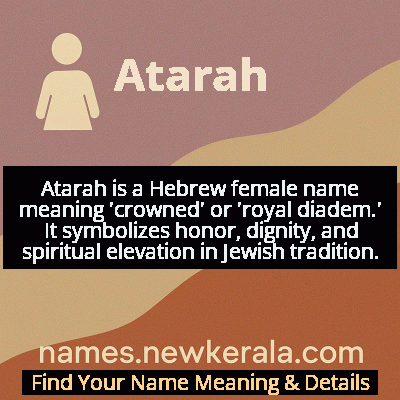Atarah Name Meaning & Details
Origin, Popularity, Numerology Analysis & Name Meaning of Atarah
Discover the origin, meaning, and cultural significance of the name ATARAH. Delve into its historical roots and explore the lasting impact it has had on communities and traditions.
Name
Atarah
Gender
Female
Origin
Hebrew
Lucky Number
4
Meaning of the Name - Atarah
Atarah is a Hebrew female name meaning 'crowned' or 'royal diadem.' It symbolizes honor, dignity, and spiritual elevation in Jewish tradition.
Atarah - Complete Numerology Analysis
Your Numerology Number
Based on Pythagorean Numerology System
Ruling Planet
Uranus (Rahu)
Positive Nature
Strong sense of order, loyal, practical, and disciplined.
Negative Traits
Stubborn, overly serious, rigid, and prone to feeling restricted.
Lucky Colours
Blue, gray.
Lucky Days
Saturday.
Lucky Stones
Blue sapphire.
Harmony Numbers
1, 7, 8.
Best Suited Professions
Managers, engineers, accountants, organizers.
What People Like About You
Dependability, discipline, practicality.
Famous People Named Atarah
Atarah Ben-Tovim
Musician and Educator
Founded Atarah's Band to introduce classical music to children
Atarah Jaffe
Actress
Prominent Israeli theater and television performer
Atarah Hazzan
Religious Scholar
Jewish educator specializing in women's spiritual development
Name Variations & International Equivalents
Click on blue names to explore their detailed meanings. Gray names with will be available soon.
Cultural & Historical Significance
Throughout Jewish history, names with royal meanings have been popular as they express hope for the child's future and connection to Jewish heritage. The name also resonates with the concept of the 'crown of Torah' - one of the three crowns mentioned in Pirkei Avot (Ethics of the Fathers), representing the highest spiritual achievement in Jewish tradition. In modern times, the name continues to be chosen by families who wish to honor their heritage while bestowing upon their daughter a name that suggests dignity, leadership, and spiritual worth.
Extended Personality Analysis
Women named Atarah are often perceived as possessing natural leadership qualities and regal bearing. They tend to carry themselves with dignity and confidence, often inspiring respect from others. Many Atarahs demonstrate strong organizational skills and a natural ability to take charge of situations, making them effective in leadership roles. They typically value tradition and family heritage while maintaining a forward-thinking perspective.
Emotionally, Atarahs are often described as warm yet composed, with a strong sense of justice and fairness. Their 'crowned' nature manifests not in arrogance but in a quiet assurance and the ability to uplift those around them. They frequently excel in careers that allow them to mentor others or preserve cultural traditions. The name suggests someone who balances strength with compassion, and who naturally assumes positions of responsibility while maintaining humility and grace.
Modern Usage & Popularity
Atarah remains a relatively uncommon but cherished name in Jewish communities worldwide, particularly among those seeking meaningful Hebrew names with royal connotations. While not ranking in the top 1000 names in the United States, it has maintained steady usage among Jewish families and those appreciating biblical names. The name has seen a slight increase in popularity in Israel and among progressive Jewish communities who value traditional names with strong meanings. It's often chosen by parents who want a name that reflects both heritage and aspirations for their daughter's future, appealing to modern parents seeking unique yet meaningful names that aren't overly common while maintaining cultural authenticity.
Symbolic & Spiritual Meanings
Symbolically, Atarah represents not just physical crowns but the concept of inner royalty and spiritual elevation. It embodies the idea that true nobility comes from character, wisdom, and moral integrity rather than birthright. The name suggests being 'crowned' with blessings, honor, and divine favor, representing the highest achievements in life - whether in knowledge, virtue, or personal accomplishments. In Jewish mysticism, the crown symbolizes the highest sefirah of Keter, representing the divine will and the connection between God and creation, thus carrying deep spiritual significance beyond its literal meaning as an emblem of sovereignty and sacred purpose.

